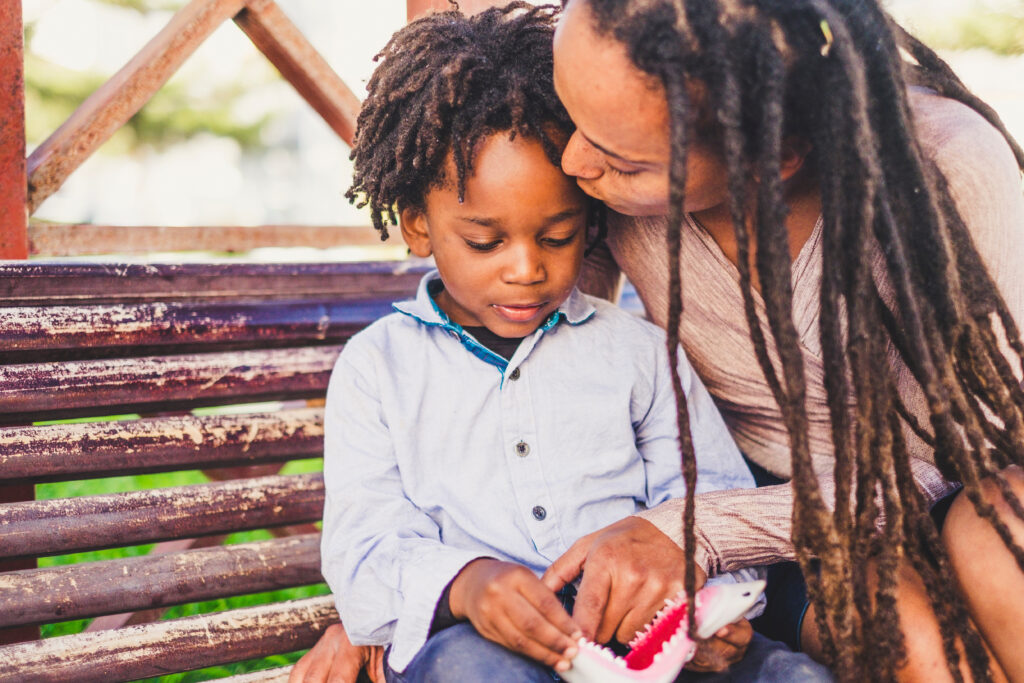
Happy couple black african skin people mother and son young together have fun and enjoy the outdoor leisure activity in the city - single mom with litthe child smile - playful family love concept
Telling your kids about your divorce can be one of the most difficult conversations you will ever have with them. As parents who are divorcing, it is normal to feel apprehensive, worried, and even guilty about how your kids will react to the news.
However, there are ways to approach this situation that can help make the conversation more comfortable for both you and your children. In this post, we will be sharing some tips and strategies to help you navigate through the tough conversation with your kids.
Plan Your Conversation
Before telling your kids about your divorce, it is essential to plan what you want to say and how you will say it. Both parents should be present for the conversation and agree on the key points to be discussed.
Choose an appropriate time when your kids are relaxed and well-rested, and you are not in a rush or busy with other things. Also, choose a private place where your kids can feel comfortable asking questions, and you can have an open conversation without any distractions.
Be Honest and Age-Appropriate
It is essential to be honest, but age-appropriate when telling your kids about your divorce. Use simple language that your kids can understand, and avoid giving unnecessary details about the legal procedures or the cause of the divorce. Reassure your kids that they are not to blame for the situation and that both parents still love them unconditionally. Also, do not promise things that you cannot keep, like reconciliation or not moving away.
Age-appropriate conversations vary depending on your child’s age and understanding. For younger children, it is best to keep the conversation simple and straightforward, focusing on how things will change and what will remain the same in their lives.
For older kids, you can be more open about the reasons for the divorce but still be mindful of what information is necessary to share. Reassure them that they can always come to you with any questions or concerns, and be prepared to answer honestly.
Listen to Your Kids
It is natural for your kids to have a lot of questions, fears, and emotions after hearing about the divorce. Encourage them to ask any questions and validate their feelings. Listen patiently to what they have to say and avoid criticizing or blaming the other parent in front of your kids, as it can make them feel insecure and confused. Make sure your kids know they can always come to you and share their feelings, and reassure them that they will still have a family, but with some changes.
It is essential to listen to your kids, but it is also crucial to set boundaries when necessary. Sometimes, children may express anger or resentment towards one or both parents during the conversation. While it is vital to acknowledge their feelings and validate them, it is not helpful to let them disrespect you or the other parent. Set clear boundaries and remind your kids that even though their feelings are valid, it is not okay to be hurtful or disrespectful. Encourage them to express their emotions in a healthy and respectful way.
Get Professional Help
Divorce is a challenging time for everyone, especially for kids. If you notice that your kids are struggling to cope with the situation, consider seeking professional help. A therapist or counselor can help your kids understand and process their emotions and help them develop positive coping skills. You can also seek co-parenting counseling to help both parents work together to provide the best possible support to your kids.
It is important to remember that children may struggle with accepting the role of a divorce lawyer. They may feel like they are being caught in the middle and have conflicting loyalties between their parents. It is essential to reassure your child that it is not their responsibility to choose sides or make any legal decisions.
No matter what, remind them that both parents still love them and will continue to support and care for them. It may also be helpful to involve your child in the decision-making process, such as choosing a custody arrangement or deciding on living arrangements, if age-appropriate. This can help them feel more involved and empowered during this difficult time.
Provide Stability and Routine
Divorce can bring a lot of changes in your family’s life, but it is necessary to maintain some stability and routine for your kids. Keep their schedules as consistent as possible, and try to maintain the same living arrangements, school, and activities unless necessary.
Avoid bad-mouthing or criticizing the other parent in front of your kids and work with your ex-spouse to provide a united front for your kids. It is also essential to show affection and support to your kids, even if they have a hard time showing it back.
Telling your kids about your divorce is never easy, but with the right approach, it can be a conversation that helps your kids understand and adjust to the changes in their family’s life. Remember that honesty, age-appropriate communication, listening, professional help, and stability are crucial elements that you need to consider when approaching this conversation. As parents who are divorcing, it is essential to put your kids’ welfare first and work together to provide the best possible support for your kids during this difficult time.


